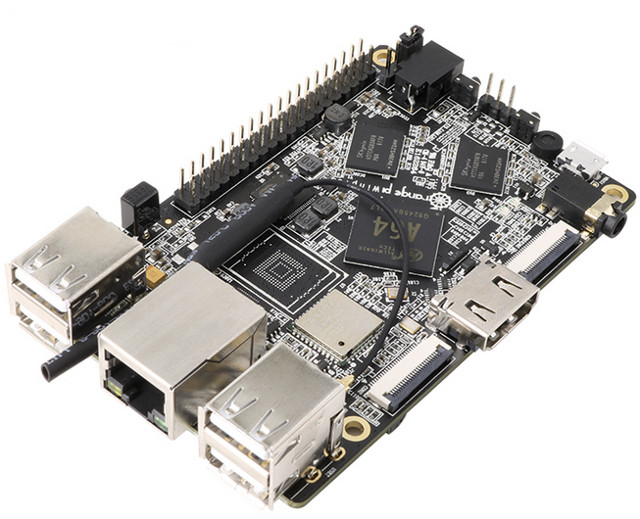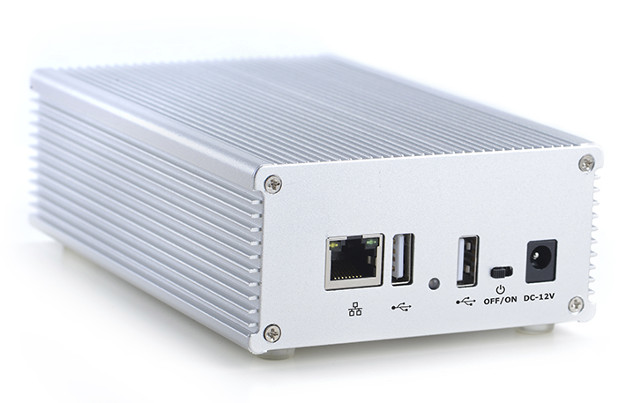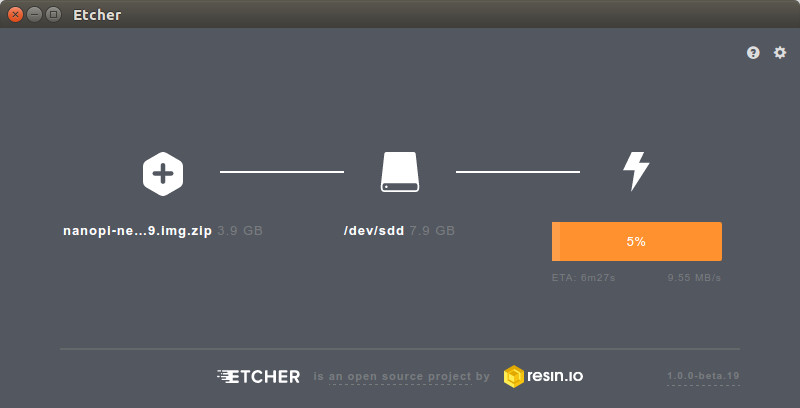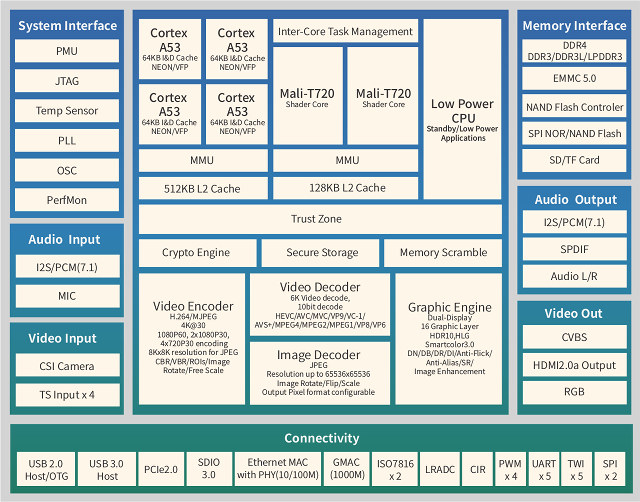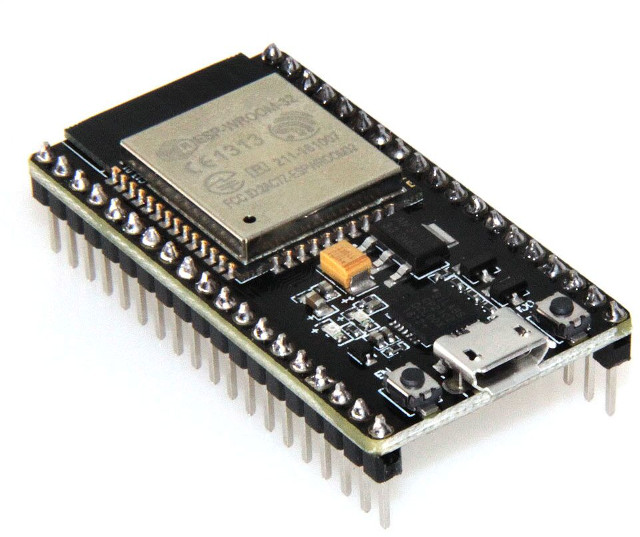Shenzhen Xunlong has already been selling 64-bit ARM development board with their Orange Pi PC 2 & Orange Pi Zero Plus 2 H5 boards based on Allwinner H5, as well as Orange Pi Win board powered by Allwinner A64 processor. However, so far none of them are equipped with much memory, with the only options being 512MB or 1GB RAM. The company has recently launched two new boards with 2GB RAM, namely Orange Pi Win Plus featuring Allwinner A64 SoC, and Orange Pi Prime equipped with Allwinner H5 SoC. Orange Pi Win Plus That board is just an update to Orange Pi Win board with the only difference I could find being the 2GB RAM: SoC – Allwinner A64 quad core ARM Cortex A53 processor @ 1.2 GHz with Mali-400MP2 GPU System Memory – 2GB DDR3 Storage – 2MB SPI flash, micro SD slot up to 64GB, footprint for optional […]
FriendlyELEC Introduces $12.99 1-bay NAS Dock Kit for NanoPi NEO & NEO 2 Boards
NanoPi NEO is a tiny board with Fast Ethernet and USB 2.0 interface, so in theory it could make a nice low-end NAS as long as you don’t need the best performance. As always the problem is that there was no case for it, but FriendlyELEC changes that as they just launched a 1-bay NAS Dock Kit for NanoPi NEO / NEO 2 board selling for just $12.99 (promotional price at launch). The kit comes with the following: 1-bay NAS Dock expansion board with JMicron JM20329 USB to SATA bridge SATA connector for 2.5″ HDD drive Extra USB host port On/off switch, and dual color status LED Header to connect NanoPi NEO board 12V DC power input Dimensions – 151 x 89.7 mm NS-120 aluminum enclosure (154 x 100 x 47.5 mm, 4141 grams) Heatsink set for NanoPI NEO M3 6mm screws, M2.5 6 mm screws Four rubber pads Front […]
Sen5 Dual Tuner Android Set-top Box Review – Part 1: Unboxing and Teardown
There are only a few companies manufacturing Android TV boxes with tuners with names like VideoStrong and WeTek coming to mind. Shenzhen Sen5 Technology is another one, and the company sent me one of their DVB combo Android TV boxes for review without providing that many details. So let’s have a look at what I received. Sen5 Android Combo STB Unboxing The product might be not ready for retail just yet, as I received it in an old carton box. Once I remove all the bubble wraps, I ended up with the device, an IR remote control, and a 12V/1.5A power supply. Once the product is actually launched I’d expect you’d receive a retail package and a user’s manual too. The box itself is made of plastic with plenty of randomly arranged (ventilation) holes on the top. The front panel comes with an IR window and a “Standby button”, one […]
Open Source ARM Compute Library Released with NEON and OpenCL Accelerated Functions for Computer Vision, Machine Learning
GPU compute promises to deliver much better performance compared to CPU compute for application such a computer vision and machine learning, but the problem is that many developers may not have the right skills or time to leverage APIs such as OpenCL. So ARM decided to write their own ARM Compute library and has now released it under an MIT license. The functions found in the library include: Basic arithmetic, mathematical, and binary operator functions Color manipulation (conversion, channel extraction, and more) Convolution filters (Sobel, Gaussian, and more) Canny Edge, Harris corners, optical flow, and more Pyramids (such as Laplacians) HOG (Histogram of Oriented Gradients) SVM (Support Vector Machines) H/SGEMM (Half and Single precision General Matrix Multiply) Convolutional Neural Networks building blocks (Activation, Convolution, Fully connected, Locally connected, Normalization, Pooling, Soft-max) The library works on Linux, Android or bare metal on armv7a (32bit) or arm64-v8a (64bit) architecture, and makes use […]
NanoPi NEO2 Board Benchmarks with Ubuntu 16.04.2 using Linux 3.10 and Linux 4.10
I’ve received NanoPi NEO 2 boards, add-boards and sensor modules last week, where we could see how small the boards were, and how it could be suitable for IoT projects or “hardware hacking” education. Before testing the board with the add-ons, I have to select the image to run on the board, and currently we have two choices: Ubuntu 16.04.2 FriendlyELEC image with Linux 3.10 “legacy” kernel, or Armbian Ubuntu 16.04.2 Xenial nightly build with Linux 4.10 “mainline” kernel. So I decided to try both: dfssf nanopi-neo2-ubuntu-core-qte-sd4g-20170329.img.zip (296 MB) is the image from FriendlyELEC (previously FriendlyARM) Armbian_5.27.170401_Nanopineo2_Ubuntu_xenial_dev_4.10.0.7z (222 Mb) is the image from Armbian, which I downloaded on March 31st despite the filename including “170401” string You can flash the image with Win32DiskImager (Windows) or dd (linux) to a micro SD card the usual way, and while I’ve never personally had troubles with dd, I’ve been told Etcher was better, […]
Allwinner H6 Processor for 4K HDR Set-Top Boxes Supports USB 3.0, PCIe, and Smart Card Interfaces
Allwinner H6 is a new quad core Cortex A53 processor designed for 4K set-top boxes. It will support “6K” video decoding for 10-bit HEVC, VP9, and H.264, integrate HDR10 and HLG video processing, support high speed interfaces like USB 3.0 and PCIe, as well as security features like two ISO7816 smart card interfaces and DRM solutions. Allwinner H6 specifications: CPU – Quad-core ARM Cortex A53 with NEON, hardware Java acceleration, and FPU 3D GPU – Dual shader ARM Mali-T720 with support for OpenGL ES3.1/3.0/2.0/1.1, OpenCL 1.1/RenderScript, Microsoft DirectX 11 FL9_3 Memory I/F – DDR4/DDR3/DDR3L interface Storage I/F – 1x eMMC 5.0 flash interface, 1x NAND Flash interface for SLC/MLC/TLC flash memory with up to 80-bit error-correcting code (ECC), 1x SPI NOR Flash interface, 1x SD Card 2.0 Multimedia via Allwinner Phoenix 3.0 VE Engine Video Decoder H265/HEVC Main/Main10 [email protected] High-tier ;4K@60fps, up to 6Kx4K@30fps H264/AVC BP/MP/[email protected], MVC, 4K@30fps VP9,Profile 0/2, […]
Is NodeMCU ESP-32S Board Now Selling for $8.50 Shipped?
ESP32 SoC with WiFi and Bluetooth launched last September for around $3, followed soon after by ESP32 modules for $7, and a few weeks later, easier to use ESP32 development boards were introduced, but sold for around $20 likely due a mismatch between supply and demand. That’s not overly expensive, but in a world of $4 ESP8266 boards and $10 Raspberry Pi Zero W with Linux, WiFi and Bluetooth, it may feel that way. But today, I noticed DealExtreme sold GeekWorm ESP32 board with ESP-WROOM-32 module for just $11.64 shipped. That’s good progress, but surely Aliexpress must now have cheaper options, and sure enough, I could find NodeMCU ESP-32S board (now confirmed NOT to be an official NodeMCU devkit) sold for $6.95 + shipping, which brought the price up to about $8.50. NodeMCU ESP-32S specifications: Wireless Module – ESP-WROOM-32 with Espressig ESP32 dual core processor with 802.11 b/g/n WiFi and […]
MQMaker Koala is a Features-Packed Development Board Powered by Rockchip RK3288 Processor
MQMaker launched MiQi board based on Rockchip RK3288 quad core Cortex A17 processor last year with the hardware aimed at hobbyists and makers, but the company has been developing a higher-end board – named Koala – based on the same processor, featuring many more ports and features, and geared towards the enterprise market. Koala board preliminary specifications: SoC – Rockchip 3288 quad core ARM Cortex A17 up to 1.8 GHz with Mali-T764 GPU supporting OpenGL ES 1.1/2.0 /3.0, and OpenCL 1.1 System Memory – 2GB DDR3 (default) Storage – 16 GB eMMC flash (default) + micro SD slot Video Output / Display Interface – HDMI 2.0, header for eDP, MIPI, LVDS, LCD backlight header, touch panel header Audio – HDMI out, optical S/PDIF, 3.5mm analog stereo audio jack, microphone header, audio L/R header Connectivity – Gigabit Ethernet, WiFi or WiFi + Bluetooth module, mini PCIe slot for 3G/4G card + SIM card slot USB – 4x […]


